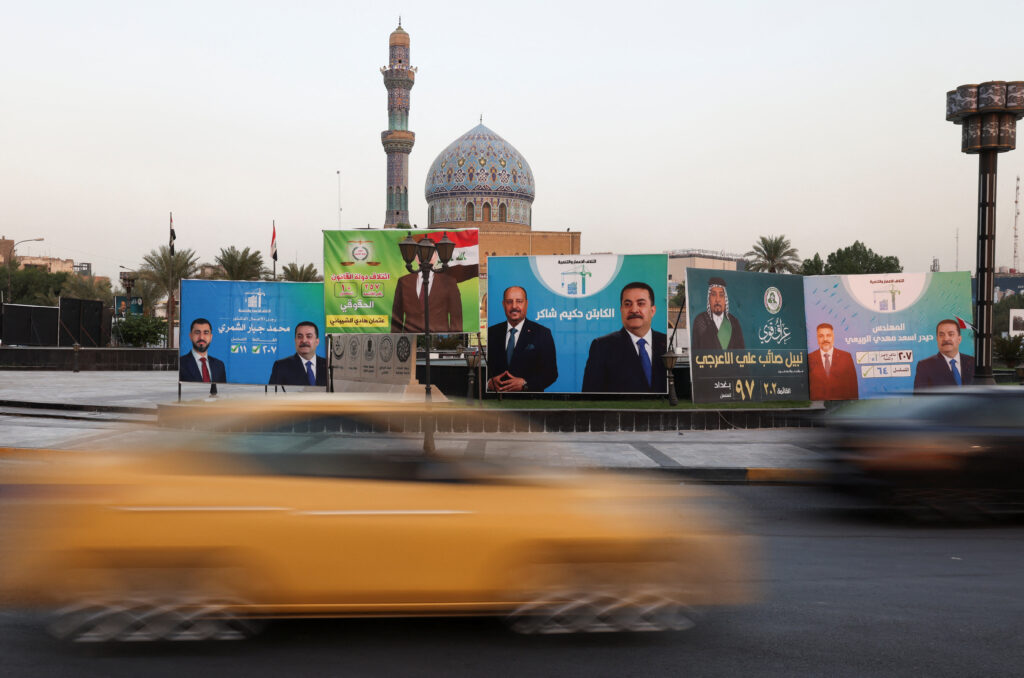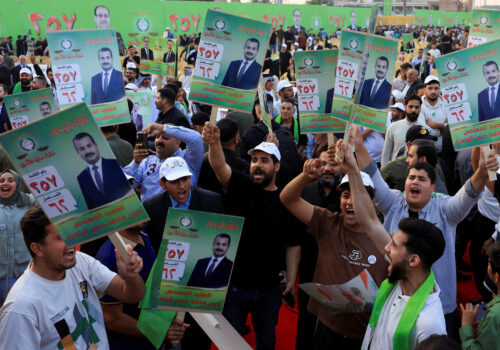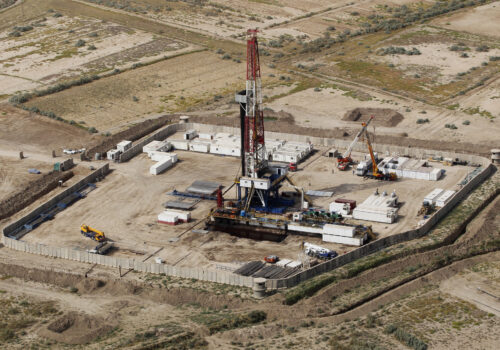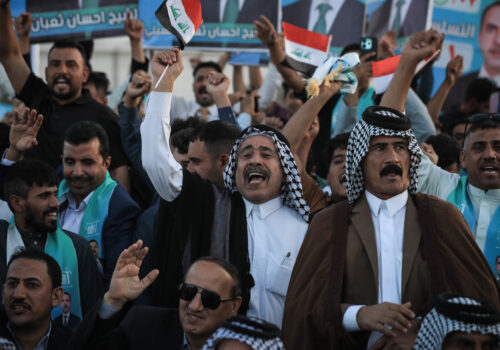BAGHDAD—Iraq approaches its sixth parliamentary election with few crises, little violence, and an elite consensus to keep the machinery of government turning. But this apparent quiet is not an indication of the country’s long-term stability. The essential features of Iraqi politics—informal decision-making that precedes formal ratification, the quota-based muhasasa that trades portfolios for loyalty, and factious security forces—remain unchanged.
The November 11 election will bring some change. The vote will likely redistribute parliamentary weight and speed government formation, especially with influential Shia cleric Muqtada al-Sadr out of the fray. Yet the election will not alter the fundamentals of power in Iraq. The country’s trajectory over the next year will be determined less by the ballot results and more by how leaders answer a few important post-election questions: Who will emerge in bargaining over government ministries? Can Baghdad and Erbil codify a predictable fiscal and hydrocarbon settlement after a government is formed? And can the state find solutions to four slow-burning stressors in Iraqi society—water and climate problems, migration-aggravated tension in cities, narcotics trafficking, and the over-centralization of power in the capital?
For outside partners, especially the United States, the best approach in the post-election period will be neither maximalist condition-setting nor strategic indifference. Instead, partners should exercise targeted leverage to use this moment of relative political calm to establish institutional rules.
The absence of an emergency is not stability
The first thing visitors notice today in Baghdad is the texture of daily life. The temperature of politics feels lower than in the searing years of crisis. While armored convoys can still be seen across Baghdad, there are fewer of them; blast walls are less suffocating; cabinet meetings happen as scheduled; the civil service, for all its patronage, goes to work. But the Iraqi parliament is the most dysfunctional institution.
It is tempting to call this stability, to confuse the absence of emergency with the presence of law and order. Yet the deeper structure of authority remains what it has been for much of the post-2003 era: Consequential decisions are negotiated outside of formal institutions, and they are only later packaged for parliamentary consumption; ministries are treated as instruments of partisan finance; and the state pays the salaries of some security forces that it does not actually command. What looks like stability is better understood as a negotiated political ceasefire among power brokers who have learned the costs of brinkmanship.
Two tensions define this moment. The first is the gap between form and substance. Iraq is faithful to the forms of constitutionalism—from elections to confirmation processes and budget laws—but the substance of authority is forged through leader-to-leader bargains, diwaniya conclaves, and coalition caucuses that operate before and beyond legal procedure. Policy is not developed through party platforms that translate votes into programs; it emerges from the calculation of who controls which portfolio and which revenue stream. Citizens see procedures but do not see oversight and accountability, and they rarely experience coherence. When outcomes become unpopular, political blame dissolves into the atmosphere of collective responsibility.
The second tension is the nature of the quiet itself. Much of it is grounded less in reform than in fatigue. The 2019 protest wave rearranged incentives across the political class but did not produce a durable organizational vehicle that could convert street energy into programmatic politics and reform. Those who rode the wave of this organic protest movement are now part of the political system they promised to challenge. Youth cohorts that once marched now juggle wage work, migration dreams, and a wary accommodation with a state that can deliver incremental services but not credible horizons. Elites, chastened by the violent feedback loops of the past, now prefer a managed equilibrium that keeps predation within tolerable bounds. That equilibrium is periodically disturbed by regional aftershocks—the war in Gaza, strikes on Iran-aligned groups, border incidents, developments in Syria—but it has thus far reasserted itself quickly. Quiet endures not because the fundamentals have been fixed, but because actors have priced the costs of further breaking them.
Iraq’s regional position has evolved in ways that sustain this equilibrium. The country is no longer a front-line battlespace for transnational jihadis or an ungoverned corridor for proxy war. Instead, it functions, perhaps surprisingly, as a venue for dialogue and economic competition, a place where otherwise hostile actors can exchange messages under Iraqi auspices. Baghdad’s role in past Iran–Saudi contacts mattered less for specific deliverables than for what it signaled about Iraq’s aspiration to be a platform rather than a battlefield. Recently, Baghdad has become a rendezvous for Iranian and Egyptian diplomats to work out a four-decade-long strained relationship. The Kurdistan Regional Government (KRG) in Erbil has long played the role of interlocutor between Turkey and the Gulf countries and even Turkey and France. Now it’s helping resolve the Kurdish question in Turkey. However, Iraq’s aspiration has limits. Legal prohibitions on engaging Israel and the risk of militia adventurism continue to constrain Baghdad’s diplomacy during the Gaza conflict, forcing Iraq’s top diplomat, Fuad Hussein, to calibrate between domestic law, regional passions, and the practical necessity of de-escalation. Still, the larger picture is one of rising but bounded Iraqi agency, in which the state can sometimes resist and can sometimes broker, but sometimes has to concede to keep the equilibrium intact.
Within that regional frame, Iranian influence has changed character more than it has receded. The networks remain, the allies are in place, and the access points in commerce and security persist, yet Tehran has exercised its leverage more quietly in recent months. I am told that Tehran has replaced its entire cohort of influence in Iraq with the same people who took on the Iraqi dossier after 2003. These new old people report not to Iran’s Islamic Revolutionary Guard Corps, but rather to the supreme leader’s office. Iraqis believe this is an indication that Iran is here to stay. Iran’s Iraqi partners read this as a tactical decision: The capacity to disrupt is undiminished, but the preference is to do so only if outcomes threaten red lines.
The state of Iraqi politics today
No issue better illustrates the blend of continuity and change than the Popular Mobilization Forces (PMF). The PMF is not a single actor, and treating it as such obfuscates more than it clarifies. It is more accurate to think of it in terms of four camps. The first is the pro-Iran camp, which includes factions that predate 2014 and whose ideology is explicitly transnational. Within this camp, there is a political wing that competes in elections and seeks to preserve military capacities as insurance. A nonparty wing, the Islamic Resistance, eschews the ballot, exerts influence through intimidation and extortion, and resists subordination to the commander-in-chief. The second camp consists of volunteers mobilized in 2014, when the army and police faltered against the Islamic State. These units typically have workable relations with the government and resent domination by the first camp. The third are Sadr-aligned elements, now largely invisible within PMF structures, reflecting the movement’s distance from formal politics for now. The fourth are tribal and local formations—Yazidi, Turkmen, and Assyrian among them—that have grown as instruments of local employment and control and that are broadly manageable within cabinet politics.
The governance dilemma is concentrated in the first camps’s nonparty wing. Here are men whose salaries are paid by the state, whose legal status is ambiguous in practice if not on paper, and whose chains of loyalty extend beyond the Iraqi state. The damage they do is not always explosive, but it is often corrosive. They alter the risk calculus for investors, undercut professional policing, and create a market for protection that blurs the line between politics and racketeering.
Against this backdrop, what will the November 11 election change? It will likely change mechanics and bargaining positions but not the rules of the game. This will be the least internationally monitored national vote in years. It’s an Iraqi-run process that many Iraqi elites view as a test of sovereignty. Political leaders cite biometric card uptake and new registrations to predict stronger turnout. Civil society is less sanguine, expecting apathy to persist. Either way, the process will go forward, and the result will likely be a recalibration. With Sadr abstaining, Prime Minister Mohammed Shia’ al-Sudani’s coalition is well placed to translate incumbency and a narrative about him improving public services into additional seats. Kurdish politics will play out as another round of bargaining between the Kurdistan Democratic Party (KDP) and the Patriotic Union of Kurdistan (PUK); Sunni politics will likely involve consolidation by established figures and a chase by rivals. Within Shia politics, offshoots of the coordination framework will likely compete for the same slices of the electorate.
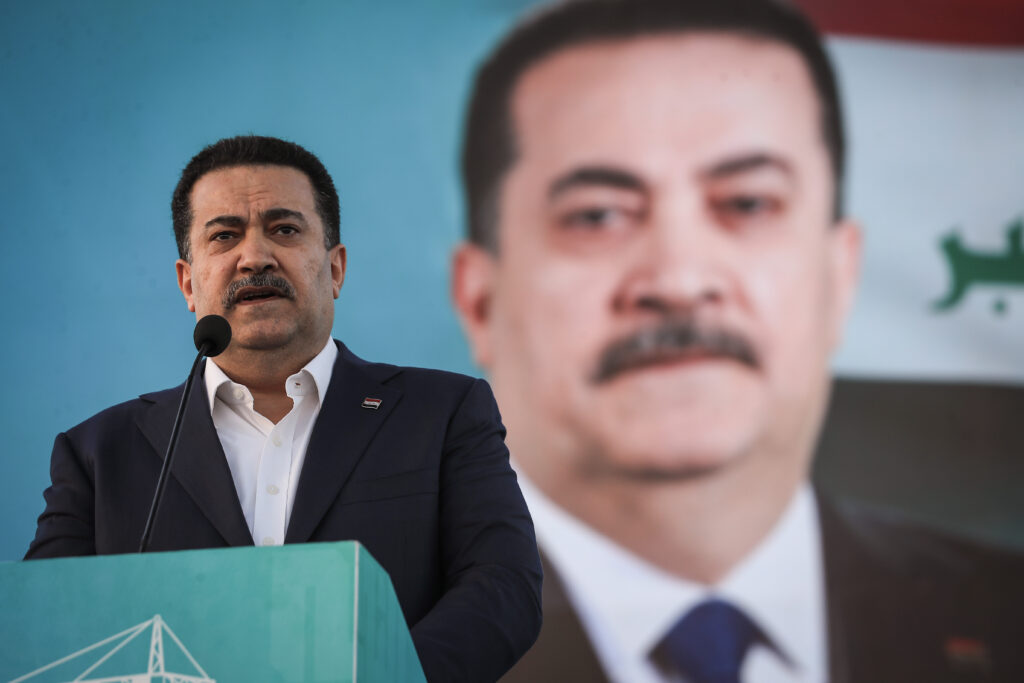
But the decisive action comes after the vote. The muhasasa will endure, as it has through reformist rhetoric and technocratic experiments. This is not the product of bad faith alone; it is baked into a structural fact that no party contests every district, no bloc aspires credibly to a majoritarian program, and the memory of unilateralism is associated with violence and the entrenchment of enemies. In practice, the election sets the price, not the product. Ministry shares are apportioned by informal formulas, and the real haggling is over which portfolios change hands. Some swaps are effectively pre-baked. Sovereign posts follow convention: a Shia prime minister, a Kurdish president, a Sunni speaker. The defense ministry is typically in Sunni hands. It’s a balance enforced not by law but by the mutual fear of exclusion.
Under these conditions, the question of Sudani’s second term clarifies how power works in Iraq. The prime minister expects to gain a larger number of seats and might have earned credit among many Iraqis for helping to deliver steadier services, such as improved roads and electricity oversight. Still, the political class carries the lesson of former Prime Minister Nouri al-Maliki into every formation: second terms are dangerous because they can become vehicles for centralizing power. Sudani is already under scrutiny for his statist view of government. Yet without a renewed premiership, Sudani’s coalition’s cohesion may erode as fast as it coalesced. His rivals, including al-Maliki, have little incentive to allow entrenchment. The likely outcome is not Sudani installed for another term, but rather a prime minister in the same mold as Sudani: balanced between Tehran and Washington, apparently technocratic, and above all not threatening to other leaders’ equities. The good news is that formation could be faster than the year-long stalemates of recent cycles, especially with Sadr outside the room and regional volatility discouraging a vacuum. The bad news is that a quickly formed cabinet may still be staffed according to partisan loyalty, with its technocrats appointed where optics demand, and its directors-general left to the centrifugal logic of patronage.
Kurdish politics will be important, as always, in who becomes the next Iraqi president and in the health of Baghdad–Erbil relations. The presidency will almost certainly remain Kurdish, but whether a KDP or PUK figure holds it will depend on another grand bargain among power brokers. The KDP has argued that seat strength grants it a right to nominate a president, while the PUK has asserted that institutional balance and territorial control justify one of its members in the post. Tehran would likely prefer a PUK figure, not least for the leverage over a Shia-led cabinet such an outcome could offer.
Sadr’s absence looms over all of this. In 2021, he won decisively, tried to form a majority government, failed, and withdrew. His logic is intelligible. By denying his imprimatur to a system he condemns, he preserves the outsider brand for a future return. The costs are real: cadres defect to other blocs; local networks atrophy; former members of parliament feel abandoned. But in the near term, his absence simplifies the arithmetic of coalition-building: He is unlikely to disrupt the vote or the formation. If a new protest wave emerges from below, he may join it rather than start it, but there are few signs that such a wave is imminent. In some sense, Sadr’s absence is the essence of this season’s quiet: fewer spoilers, more deals, less drama.
A falsifiable and straightforward test
The real test lies in whether elites use the post-election period as a window of opportunity to agree to codify rules where improvisation has failed for over two decades. Hydrocarbons and fiscal flows are the most obvious openings in the next cabinet. Targeted US pressure made possible recent progress on salary transfers to KRG civil servants and steps toward resuming oil flows through Ceyhan in Turkey. Optimists hope these steps can seed a hydrocarbon law with predictable revenue-sharing, auditability, and a dispute mechanism that prevents annual brinkmanship. Skeptics warn that once the polls close, the logic of coalition bargaining over the spoils of the next cabinet will take over, with oil and salaries again treated as chips on the table.
Therefore, the best analytical marker for the year ahead is falsifiable and straightforward: Does Iraq codify a formula that makes budgets and oil flows depoliticized and automatic rather than unplanned? If it does, then the country builds on its current political cease-fire toward long-term stability in one of its most volatile arenas. If it does not, then expect recurring political and financial crises that bleed confidence between Kurdistan and Iraq, with implications for the country’s overall political stability.
Four threats to Iraqis in the year ahead
Whoever leads Iraq next will face four slow-burning stressors threatening the country. The first is water and climate. Upstream controls by Turkey and Iran, salinization of southern waterways, and rising temperatures are erasing rural livelihoods. The result is internal migration into cities struggling to supply water, electricity, and waste management. In these conditions, a low water flow in the summer is not about statistics; it is an urban security problem. Adaptation is possible, including by switching crops away from water-intensive staples, reducing leakage in municipal networks, modernizing irrigation, and installing solar-powered pumps, among other steps. But Iraq must treat water as a national security priority with a single command node and a special budget to ensure social stability.
Compounding the first stressor is urban social friction. As rural families migrate, they bring traditions and customs into cities that often lead to urban conflict between tribes. The result is tribalization of urban strife, uneven policing, and spikes in crime that metastasize through neighborhoods in Basra and beyond. To address this problem, the government must help ensure steadier municipal investment, greater police professionalization, and the creation of economic alternatives. If the state cannot keep a neighborhood safe, then the neighborhood will default to its own explosive arrangements in a way that would be hard to control.
The third stressor is narcotics. Cheap synthetic drugs have spread with alarming speed in Iraq, creating new markets for cross-border trafficking that mix organized crime with militia finance and corrupt officials. Treating this purely as a security problem has predictable results: showy raids and little change in availability. The state needs a public-health approach with treatment capacity, prevention campaigns, and forensic labs that can map routes and build prosecutable cases. It also needs vetted task forces insulated from compromised units, and judges who can try cases without fear that their dockets will be traded in the next round of bargaining. Without that, drugs will become the next driver of instability, less visible than car bombs but no less lethal to the social fabric.
The fourth stressor is power centralization that goes against Iraq’s federal structure. Baghdad has pulled more authority to the center, straining relations with the provinces—especially the KRG. Comparisons with Kurdistan’s stronger services and projects have intensified pressure on the Shia political elite. Many say this has bred resentment in the prime minister’s office, which reads Erbil’s rise as a rebuke. Instead of scaling what works, the federal response has often been to slow Kurdistan—delaying budgets, instituting tariffs on Kurdish goods, tightening border controls, and limiting Kurdish companies’ foreign transactions. Iraq will advance faster when Baghdad treats Erbil’s gains as a shared national success, not something to obstruct.
The view from Washington
What, then, should outside partners do? It may be tempting for Iraq’s partners to demand sweeping political conditions that collapse under the weight of Iraq’s coalition math, or, in frustration, to disengage. But a better way is to capitalize on what has been working under the Trump administration’s practical approach.
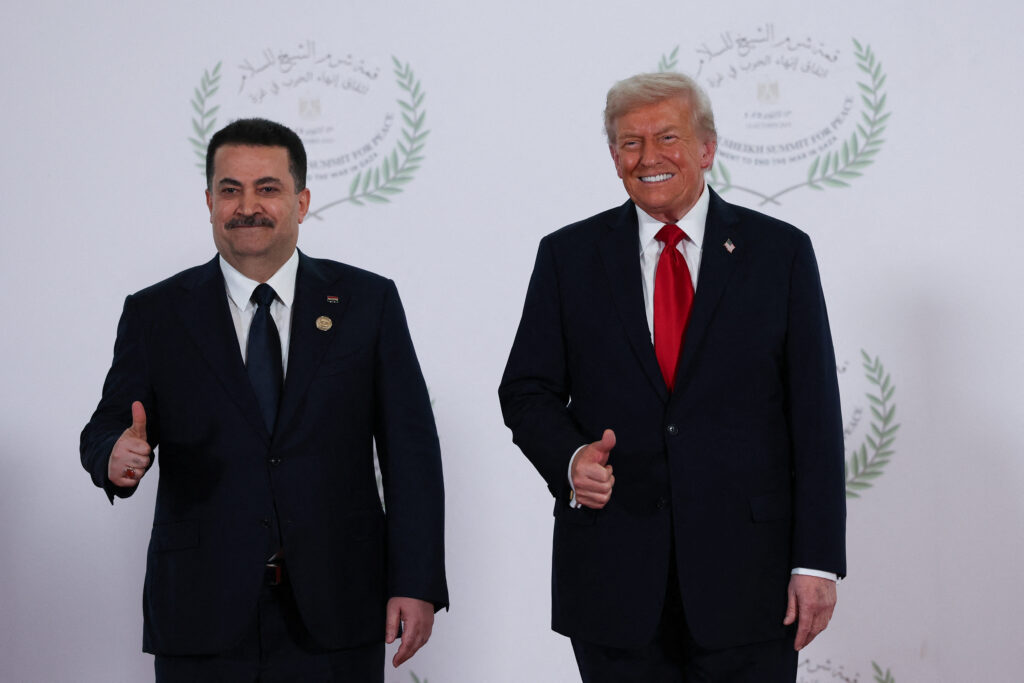
Without military engagement, the Trump administration has been able to leverage the underutilized weight of US diplomacy to block a few laws counter to US strategic interests and resolve some long-standing issues, while pressuring Baghdad to release Kurdistan’s share of the budget. At this moment, Washington has an opportunity to double down on these short-term gains and convert them into durable long-term solutions by backing a hydrocarbon legal framework—one that depoliticizes energy and budget from petty Iraqi politics, which often hold hostage the livelihood of ordinary Kurds while putting American commercial investments at risk.
Perhaps most important in the immediate future, the United States should refrain from backing any specific candidate for Iraq’s next prime minister. Iraq’s informal, consensus-driven process typically elevates the prime minister, and as a senior State Department official told me, “we are dealing with the system, not individuals.” It’s in the best interests of Washington and the Iraqi people to let the office change hands through that process, reducing the risks of authoritarianism and power consolidation that could disrupt the current political truce and the incremental improvements Iraq has achieved in recent years.
The coming election will redistribute bargaining chips and likely produce a government with less delay than in the past. But the challenge after the votes are counted is for Iraqi politicians to turn the political truce into fair rules—to reduce the distance between constitutional form and governing substance. Iraq thus far knows how to hold a vote and form a cabinet. It needs the patience and discipline to build institutions that cannot be bargained away at the next diwaniya.
As Sarhang Hamasaeed, the former director of Middle East Programs at the US Institute of Peace, recently summed up during the Iraq Research Leaders Forum in Baghdad, “Calmer is not stable.” It can, however, be the bridge to stability if Iraq’s political class and its friends choose to build on it.
Yerevan Saeed is a nonresident senior fellow with the Iraq Initiative in the Atlantic Council’s Middle East programs and previously worked in Kurdistan and Iraq as a journalist and translator for top international outlets.
Further reading
Sun, Nov 9, 2025
Tracking Iraq’s 2025 elections and coalition building
Trackers and Data Visualizations By
Keep up with what our experts want you to know about the Iraqi elections and the coalition building that follows.
Wed, Nov 5, 2025
Why China is here to stay in Iraq’s energy sector
MENASource By
Regardless of the specific makeup of the next Iraqi government, it is likely that Chinese firms will continue to enjoy an advantage.
Tue, Nov 4, 2025
Twelve questions (and expert answers) on the Iraq elections
MENASource By
Iraq is set to hold elections on November 11. Our experts unpack the key questions looming over the landmark vote.
Image: Campaign posters for parliamentary candidates are displayed near a mosque, ahead of the upcoming parliamentary elections, in Baghdad, Iraq, October 8, 2025. (REUTERS/Ahmed Saad)
